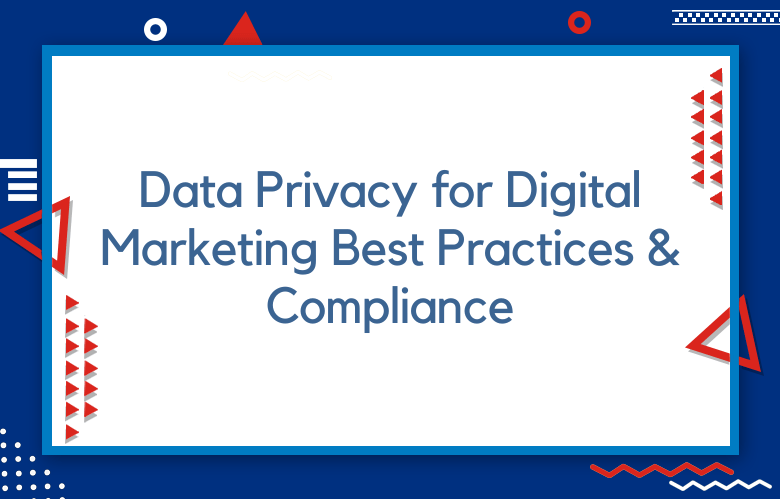Data Privacy for Digital Marketing Best Practices & Compliance

Data privacy has become a cornerstone of ethical and effective digital marketing practices in the digital age. As businesses increasingly rely on data-driven strategies to target and engage consumers, the need for stringent data privacy measures and compliance with regulatory standards has never been more critical. Best data privacy practices protect consumers’ personal information, build trust, and enhance brand reputation.
Data Privacy for Digital Marketing: Best Practices & Compliance
Navigating the data privacy landscape involves understanding and adhering to various global and regional regulations, such as the General Data Protection Regulation (GDPR) in the European Union, the California Consumer Privacy Act (CCPA) in the United States, and other similar laws around the world. These regulations mandate how businesses should collect, process, store, and share consumer data, emphasizing the need for explicit consent, transparency, and the right to privacy.
Best practices in data privacy for digital marketing include implementing robust security measures to protect data from breaches, ensuring transparency in data collection and usage policies, and providing consumers with control over their data. This includes precise opt-in mechanisms for data collection, easy access for consumers to view, modify, or delete their personal information, and strict adherence to data minimization principles, ensuring that only necessary data is collected.
Moreover, businesses must ensure that their partners and third-party vendors comply with these privacy standards, as data sharing and processing often involve multiple entities. Regular audits and assessments can help identify potential vulnerabilities and ensure ongoing compliance.
Data privacy in digital marketing is not just about legal compliance; it’s about respecting consumer rights and fostering an environment of trust and transparency. By adopting best practices in data privacy, businesses can avoid legal pitfalls and enhance their customer relationships and brand value in the digital marketplace.
- Key Takeaways
- Understanding Data Privacy Basics
- Impact of Privacy Regulations on Marketing
- Challenges in Data Privacy for Marketers
- Safeguarding Customer Data Privacy
- Best Practices for Data Privacy Compliance
- Responsible Data Collection Strategies
- Building Trust Through Transparency
- Future-Proofing Marketing Strategies with Privacy in Mind
- Key Considerations for Ensuring Compliance
- Final Remarks
- Frequently Asked Questions
- What are the fundamental principles of data privacy for digital marketing?
- How do privacy regulations impact digital marketing strategies?
- What challenges do marketers face in maintaining data privacy?
- How can businesses safeguard customer data privacy effectively?
- What are some best practices for ensuring data privacy compliance in digital marketing?
Data privacy for digital marketing has become a critical concern in today’s online landscape. With the increasing amount of personal information shared online, safeguarding this data is paramount. Understanding the importance of protecting user information builds trust and ensures compliance with regulations. As businesses leverage data to personalize marketing strategies, maintaining stringent privacy measures is vital to safeguard consumer trust and loyalty. This blog post delves into the significance of data privacy in digital marketing, exploring best practices and strategies to uphold confidentiality while maximizing marketing efforts effectively.
Key Takeaways
- Understand the basics of data privacy to navigate the complex digital marketing landscape.
- Adhere to privacy regulations to avoid legal implications and maintain consumer trust.
- Address the challenges in data privacy proactively by implementing robust security measures.
- Prioritize safeguarding customer data to build credibility and loyalty among your audience.
- Follow best practices for data privacy compliance, such as obtaining explicit consent for data collection.
- Emphasize transparency in data collection and usage to foster trust with consumers.
Understanding Data Privacy Basics
Definition & Importance
Data privacy in digital marketing refers to protecting individuals’ personal information collected online. It is crucial for maintaining trust with customers and complying with regulations.
Data privacy ensures that companies securely handle customer data, such as names, addresses, and preferences. This fosters a sense of trust among customers, leading to stronger relationships and brand loyalty.
Key Components of Regulations
- General Data Protection Regulation (GDPR): Enforced in 2018, GDPR governs how businesses collect and process personal data of EU citizens. It mandates precise consent mechanisms and robust security measures.
- California Consumer Privacy Act (CCPA): Implemented in 2020, CCPA gives California residents control over their personal information held by companies. It requires transparency regarding data collection practices.
GDPR and CCPA emphasize transparency, accountability, and user consent in data processing activities for customers and businesses. They aim to protect individuals’ rights to privacy while holding firms and organizations accountable for proper data handling.
Implications of Non-Compliance
Non-compliance with data privacy laws can have severe consequences for businesses. Violations may result in hefty fines, legal actions, reputational damage, and loss of customer trust.
In 2019, British Airways faced a fine of £183 million for a data breach under GDPR. This incident highlighted the importance of robust cybersecurity measures and compliance with data privacy laws.
Failure to comply with CCPA requirements can lead to penalties ranging from $2,500 to $7,500 per violation. Such financial repercussions underscore the significance of adhering to data privacy regulations for businesses operating in California.
Impact of Privacy Regulations on Marketing
GDPR & CCPA
GDPR and CCPA have significantly reshaped businesses’ digital marketing strategies worldwide. These regulations have forced enterprises to reevaluate their data collection and processing practices.
Businesses operating in the European Union had to comply with GDPR, which required obtaining explicit user consent before collecting data. This led to a more transparent approach to data collection and processing.
Consequences of Non-Compliance
Failure to adhere to privacy regulations can result in severe consequences for businesses. Fines for non-compliance with GDPR can reach up to €20 million or 4% of the company’s global annual turnover, whichever is higher.
Violating CCPA may lead to penalties ranging from $2,500 to $7,500 per intentional violation and $100 to $750 per unintentional violation. These fines can quickly add up and significantly impact businesses’ bottom line.
Benefits of Compliance
Aligning marketing practices with privacy regulations not only ensures legal compliance but also builds trust with customers. By prioritizing data privacy, companies demonstrate their commitment to protecting customer information.
Moreover, complying with privacy regulations helps improve data accuracy and quality. When users trust that businesses handle their data responsibly, they are more likely to provide accurate information, leading to better-targeted marketing campaigns.
Challenges in Data Privacy for Marketers
Transparency in Data Collection
Ensuring transparency in data collection practices is crucial for maintaining consumer privacy. Marketers must clearly communicate how they collect and use data to build trust with users. Without openness, consumers may feel misled or violated, leading to a loss of confidence and potential legal repercussions.
Navigating the complexities of data collection transparency involves providing clear and concise explanations about the types of data being collected, the purposes for which it will be used, and how users can opt out if desired. Marketers can establish credibility and foster positive consumer relationships by prioritizing transparent communication.
Obtaining Explicit Consent
Marketers encounter hurdles when seeking explicit consent from users for data usage. With privacy regulations becoming more stringent, obtaining unambiguous consent has become a priority. However, securing explicit consent can be challenging due to varying interpretations of what constitutes valid consent.
To address this challenge, marketers must implement user-friendly consent mechanisms that clearly outline the specific purposes for which data will be used. Providing options for users to easily opt in or opt out of data sharing empowers individuals to make informed decisions about their privacy preferences.
Managing Data Access and Deletion Requests
Effectively managing data access and deletion requests poses significant challenges for marketers. With an increasing focus on data protection rights, handling requests from users to access or delete their personal information requires efficient processes and robust systems in place.
Marketers must promptly establish streamlined procedures for handling data access and deletion requests while ensuring compliance with relevant privacy regulations. Failing to manage these requests effectively can result in reputational damage, regulatory fines, and loss of consumer trust.
Safeguarding Customer Data Privacy
Encryption Methods
Implement encryption techniques to protect sensitive customer data from unauthorized access or breaches. Utilize robust encryption algorithms to secure data both in transit and at rest.
Encryption ensures that even if hackers gain access to the data, they cannot decipher it without the decryption key. By encrypting customer information, marketers add an extra layer of security to prevent data theft.
Secure Storage Solutions
Utilize secure storage methods, such as cloud storage, with advanced security features like multi-factor authentication and end-to-end encryption. These solutions safeguard customer data from potential ransomware attacks and unauthorized intrusions.
Storing data securely protects customers’ sensitive information and builds trust and credibility with the audience. Marketers can leverage secure storage solutions to mitigate the risks associated with data breaches.
Robust Data Security Protocols
Establish robust security protocols within the organization to ensure comprehensive protection of customer data. Implement regular security audits, conduct employee training on cybersecurity best practices, and enforce strict access controls to prevent unauthorized data access.
Best Practices for Data Privacy Compliance
Regular Audits
Marketers should conduct regular audits to ensure compliance with data privacy regulations. These audits help identify potential vulnerabilities and gaps in data protection measures. Companies can proactively address any issues by reviewing data handling processes and security protocols.
Regular audits also enable marketers to assess the effectiveness of their data privacy strategies. By analyzing how customer data is collected, stored, and used, organizations can make necessary adjustments to enhance privacy standards. This ongoing evaluation ensures that businesses stay up-to-date with regulatory requirements and industry best practices.
Continuous Monitoring and Updates
Continuous monitoring is vital for maintaining high data privacy standards in digital marketing. Marketers must regularly review and update their privacy policies to reflect regulations or internal process changes. This proactive approach helps in mitigating risks associated with data breaches and non-compliance.
Responsible Data Collection Strategies
Ethical Practices
Data collection in digital marketing should adhere to ethical principles. It involves obtaining user consent, being transparent about the collected data, and ensuring data security.
It’s crucial to prioritize minimizing data collection by only gathering essential information. This approach respects user privacy and helps build trust with customers.
Privacy-First Approach
Adopting a privacy-first approach in data collection benefits both businesses and consumers. It enhances customer trust, reduces the risk of data breaches, and ensures compliance with regulations.
- Pros:
- Enhanced customer trust
- Reduced risk of data breaches
- Cons:
- Limitation on gathering unnecessary data
Building Trust Through Transparency
Enhancing Customer Trust
Providers in the digital marketing realm can enhance customer trust by prioritizing transparency in their data practices. When companies openly communicate how they collect, store, and utilize consumer data, it fosters a sense of trust among users. By being transparent about the type of information gathered and how it will be used, services can build a more loyal customer base.
Incorporating transparency into data privacy policies strengthens the relationship between providers and consumers and helps build trust with potential customers. When individuals feel their personal information is handled responsibly, they are likelier to engage with a brand’s products or services. This approach creates a positive cycle where satisfied customers become brand advocates.
Impact on Consumer Perception
Clear and concise privacy policies significantly impact how consumers perceive a company’s commitment to protecting their data. When employees understand the importance of data privacy and are trained to handle information securely, it reinforces that the company values its customers’ privacy. This, in turn, leads to a more positive perception of the brand.
By prioritizing transparency in data practices, companies can differentiate themselves from competitors who may not be as forthcoming about their data handling procedures. Consumers are becoming increasingly aware of the importance of data privacy, especially with regulations like the General Data Protection Regulation (GDPR) in place. Brands that prioritize transparency can leverage this awareness to gain a competitive edge.
Successful Examples
- Apple: Known for its stringent approach to privacy, Apple has built a strong reputation for safeguarding user data. From end-to-end encryption to clear opt-in mechanisms for data sharing, Apple demonstrates a commitment to transparency.
- Mozilla Firefox: The web browser emphasizes user privacy through features like tracking protection and enhanced security settings. By empowering users with control over their data, Mozilla has earned trust among privacy-conscious individuals.
Future-Proofing Marketing Strategies with Privacy in Mind
Evolving Regulations
Data privacy regulations constantly evolve, impacting digital marketing strategies for businesses worldwide. Marketers must navigate a complex landscape of laws such as the GDPR and CCPA.
Embracing these regulations is crucial for maintaining consumer trust and avoiding hefty fines. By prioritizing privacy, marketers can build stronger relationships with their audience and enhance brand reputation.
Proactive Measures
To future-proof their strategies, marketers should prioritize transparency and consent. Providing clear opt-in options and honoring data subject rights are essential to ensure compliance.
Implementing robust data protection measures, such as encryption and secure storage practices, can safeguard customer information from unauthorized access or breaches.
Staying Informed
Staying ahead of upcoming privacy laws is critical to adapting marketing tactics effectively. Regularly monitoring regulatory updates and industry best practices enables marketers to adjust their strategies proactively.
Engaging in continuous education on data privacy trends and attending relevant workshops or seminars can provide valuable insights for enhancing marketing campaigns while respecting consumer privacy.
Critical Considerations for Ensuring Compliance
Training and Education
Training team members on data privacy principles is crucial to ensure regulation compliance. All staff must understand the importance of protecting customer data.
Education sessions should cover the must-follow practices when handling personal information—regular training updates help reinforce these key concepts.
Staying Updated
Marketers must stay informed about time-sensitive developments in data privacy laws to adapt to changing regulations. A good practice is to subscribe to industry newsletters.
Regularly reviewing and updating internal policies based on new guidelines is essential. This ensures that marketing strategies are aligned with current regulations.
Final Remarks
In a digital world where data privacy is paramount, safeguarding your customers’ information isn’t just a legal obligation; it’s a trust-building exercise. By implementing best practices and staying abreast of regulations, you can future-proof your marketing strategies and build long-lasting relationships with your audience. Remember, transparency is critical, and responsible data collection is the foundation of customer trust.
As you navigate the complex landscape of data privacy in digital marketing, prioritize compliance, ethical data practices, and transparency. Your commitment to safeguarding customer data will ensure legal adherence and foster trust and loyalty among your audience. Stay proactive, stay informed, and keep privacy at the forefront of your marketing efforts.
Frequently Asked Questions
What are the fundamental principles of data privacy for digital marketing?
Data privacy in digital marketing revolves around transparency, consent, and security. Marketers must ensure they collect data ethically, protect it from unauthorized access, and use it responsibly to build customer trust.
How do privacy regulations impact digital marketing strategies?
Privacy regulations like GDPR and CCPA require marketers to obtain explicit consent for data collection, offer opt-out options, and secure customer information. Compliance ensures trust, avoids penalties, and fosters a positive brand image.
What challenges do marketers face in maintaining data privacy?
Marketers encounter challenges such as balancing personalization with privacy, ensuring compliance across different regions, managing third-party data risks, and adapting to evolving regulations while delivering effective campaigns.
How can businesses safeguard customer data privacy effectively?
Businesses can safeguard customer data by implementing robust security measures, conducting regular audits, providing clear privacy policies, educating employees on best practices, obtaining explicit consent for data usage, and promptly addressing any breaches or concerns.
What are some best practices to help ensure data privacy compliance in digital marketing for customers and employees?
Best practices include regularly updating privacy policies, obtaining explicit consent for data collection and use, encrypting sensitive data, training staff on security protocols, conducting regular audits, and staying informed about regulatory changes to adapt strategies accordingly.



